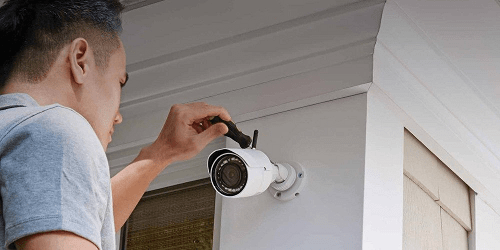
1-20-21 – SSI
The work-from-home imperative figures to have long-term ramifications for the smart security home market. Executives from four leading residential dealer firms tell where they see the silver lining around the dark pandemic cloud.
For more than a decade, residential security dealers have gotten hammered on multiple fronts. Those hits include the recession and construction bubble burst, consolidation, explosion of do-it-yourself devices and competitors, encroachment by large utility and cable companies, and drawing the interests of Big Tech like Amazon, Google and Apple.
All that, and yet perhaps the greatest disrupter of them all blindsided everyone — the pandemic. Nonetheless, and despite its enormous societal toll, some favorable residential security tailwinds are blowing.
Although few would have wished for such an ordeal, the fact is the pandemic’s shifting of workplaces to the home along with consumers spending more time at home and their intensified focus on safety has changed the landscape.
In this time of heighted stress and need, more than ever homeowners are turning to their security providers to deliver technology-based solutions that attend to their well-being, work requirements, lifestyle and leisure interests.
It is against that dramatic backdrop that SSI presents its annual Residential Dealer Roundtable in which executives from four Resideo Premier Dealer Program companies share the challenges faced, lessons learned, reasons for optimism, new opportunities, market differentiation and what they anticipate for 2021.
The Panelists
▶Lawrence Coassin is president of American Total Protection, with regional offices in Hamden, Conn., and Melbourne, Fla. Founded by his father in 2011, the company’s 65 employees serve separate fire protection and suppression, intrusion detection, and electric subsidiaries.
▶Sterling Donnelly is one of three co-founders who launched Alarm Grid out of South Florida as an online-only DIY business in 2012. Primarily focused on the residential market, the company employs 25 people and offers professional monitoring services in partnership with Criticom.
▶ Stephen Karchut is the operations manager for Alarmtech of London, Ontario, Canada. Founded in 1985, the company has a 60%/40% residential-commercial accounts mix, is a multiyear winner of the Consumer Choice award and a multiple-time recipient of the Best of London recognition program.
▶ Richie Petibon is founder and president of Petibon Alarm in Crofton, Md. In business since 1991, the firm focuses on fire alarms, access control and video systems for a 50%/50% blend of residential and commercial/government customers. The firm also offers audio systems.
What are some of the principal ways the pandemic has affected and challenged your company?
Sterling Donnelly: Being an online, do-it-yourself alarm company, we already have been game planning for this world, I suppose, because we’re already selling our products and services online and over the phone and through email and chat. Which is from what we’ve heard where a lot of the more traditional onsite companies are shifting toward, with the current environment. We’ve as a company explored remote employees and in-office employees throughout our history and we’ve found that in person is always preferable. We shifted everyone home to a remote setting while everything was first coming out. But we are back in the office now with new COVID protocols to ensure employee safety and make sure everyone’s comfortable. Luckily we’ve mostly avoided any COVID outbreaks.
Considering your DIY model, did you notice a sales uptick due to people not wanting technicians in their homes?
Surprisingly we’ve seen an increase in cancellations, certainly people who either are running into financial hardships such as losing their job. We’ve also seen shift in behavior for some customers because they’re home all the time now. They’ll say, “Well, I don’t need the monitoring as much anymore.” We’ve certainly had cancellation increases because of that. We’re hopeful and we’ve been told that a lot of those people anticipate coming back to us once things start to normalize. We’re just trying to batten down the hatches and improve some of the things we’ve been working on so on the backside we’ll hopefully be better off. I would say we’ve seen an increase in support calls from existing customers. Also with the LTE upgrades happening, we’ve got a lot of that going on too. It’s been hectic and we’re just trying to roll with it.

Lawrence Coassin: We have 65 employees split between our two offices in Melbourne, Fla., and Hamden, Conn. About 30 of those are out in the field and the other 35 are in the office. From the beginning, we tried to have extreme transparency and over-communicated. We hosted town halls every other night in the beginning of the pandemic where employees had the option to call in and ask me questions. Overall, we are trying to use the pandemic period as an opportunity to get rid of our inefficiencies, become more efficient. We’ve been fortunate our employees remain healthy. Not many have gotten sick, everyone’s onboard. We are looking to get through this stronger than we were before.
Our clients that were concerned about security prior to this are even more concerned now. Sales to our existing customers have increased. If they bought an alarm five years ago and maybe didn’t do every window, now they want to enhance their security due to the uncertainty. We have had more phone calls from people due to financial hardships, where we typically try to work with them, possibly giving them some free months until they get back on their feet. Our Connecticut business, where there have been tougher restrictions, has been more resilient than our Florida business where the state was not as strict. I would have anticipated the opposite in the beginning.

Steven Karchut: We made sure that everyone can do 99% of their job from home and had a very streamlined transition. Within about a week, we had our processes changed. Instead of handing files back and forth, we moved more digital, we started utilizing Microsoft Teams to communicate better. During this whole COVID time, we have actually communicated better and streamlined processes in such a way that our company owners never thought possible before, because we didn’t have a choice. I have told my office staff that I don’t want anybody who doesn’t feel comfortable going back onsite.
Our technicians don’t come in the office now unless they absolutely have to. I go in three times a week at 6 a.m., when nobody’s there, to pack all their boxes and leave them for the techs in the garage. We’re very fortunate that we haven’t had anyone out sick. Our residential sales haven’t gone down as much as we thought they would. Our attrition isn’t as horrible as we thought it might be leading into this, we thought we’d have a lot more clients leaving us. Our commercial business has actually grown a little bit because of people not being in their workplace every day.

Richie Petibon: Anytime that there’s uncertainty, our business is always going to be fantastic. We live in the D.C. area where when people are uneased or knocked out of their normal lives, they buy security systems. So we’ve been extremely busy. We did the home office thing, Zoomed our meetings, etc., but we never really missed a beat. Our attitude and what I told my employees was, “This is an opportunity and if you don’t want to be a part of the opportunity, then you need to go find another one.” They’ve embraced it; they wear masks and gloves, and booties, and sanitizer, we’ve done all that. I try to get my employees to buy into that whether it’s COVID, protesting, elections, whatever it might be, that’s a benefit in the security industry.
One of the biggest challenges we have had during this time has been with the supply chain, getting the products we need when we need them. We’ve actually had to go online and buy equipment, but that is what it is.
Did you have any situations where customers had financial hardships due to the pandemic and you gave them some kind of deferments or breaks and all?
Petibon: Some, for restaurant businesses, but I flipped the switch on them. I told them if you you’re having some hard times I completely understand and we will take the revenue in gift cards. We would take them in denominations of $20, then on service calls or installations we would give that to our customers and they were all happy. So it’s a win-win. We only did it with existing clients because by law here you can’t entice people to purchase something with a gift.
How has your attrition looked during the pandemic?

We’ve been great. We have a different market though because 55% of the people in the area work for the government, so as people get laid off they still get paid. We’ve been very fortunate. In 2008 with the recession we did have some pain, but it still wasn’t the same pain some of my colleagues felt elsewhere.
What are your chief takeaways from the pandemic that are likely to benefit your business or make your company stronger?
Donnelly: The biggest silver lining has been the chance to look at what we’re doing and identify some inefficiencies to work on. While there was not the increased growth we’ve seen in past years and more of a flatline, we could’ve stressed and worried but instead took those resources and put them to use. It’s all about having high levels of trained, experienced technicians who can sell our products over the phone and give people confidence we’re the right company for them. We doubled down on that and invested in some new techs. We brought in guys with strong industry experience and focused on training them on the Alarm Grid way. We are laying the foundation so when it’s back to business as usual we can pull some levers to drive growth.
Coassin: For us it was seeing our employees step up. We got rid of the pretenders. I’ve been so impressed by our staff, with people asking what they can do to help. At the end of this, I know who my true buddies are. I know who’s going to go through thick and thin with me and I know I have the right people. We are using this as a chance to streamline efficiencies as well and I really think we’re going to come out of this stronger, especially compared to our competitors.
Karchut: My first takeaway is that remote work is not the enemy. As an industry I think we’re very hesitant to have our staff all over the place and maintain a level of client care. We went for it headfirst and it has worked out. My second takeaway is to make sure your processes work. If they don’t work when you’re all together in the office they’re sure as heck not going to work when you’re all at home working.
Petibon: My biggest takeaway is how we improved our process. We had a lot of minutia, checks and balances … check, check, check. I learned very rapidly that in order to be profitable, make money and empower employees and continue to advance them you have to optimize your processes. We eliminated all kinds of hiccups and just stupid things that we were doing, that over 25 years you do. Now the employees know this is what we do, this is how we do it, and move forward, move fast. And we did it all through technology, like accepting credit cards through cellphones and the money going into the bank immediately, we changed everything, zip, zip, zip.
Do you see the work-from-home trend or other pandemic-related factors driving any particular product or service opportunities?
Karchut: Working from home should be. I’m definitely writing that down so I can push it to our next sales team meeting to start looking at accountants and lawyers and people who have sensitive information at home now who will need that enhanced level of security. Here in Ontario, Canada, if you’re working from home and you have an alarm system because you have sensitive information, your corporation can pick up 100% of the tab as a tax-deferred expense. Definitely you gave me something to think about and add to my sales meeting agenda!
Otherwise we’re going full steam ahead with the [Resideo] ProSeries, which is so easy to deploy. We’re leading with that for new residential, using the convert-to-wireless modules to take over hardwired homes. The product allows us to take over pretty much any style of sensor. Our clients love the functionality and Alexa capability, and there are fewer truck rolls for us thanks to the over-the-air updates.
Coassin: Our biggest partners in terms of referrals are IT companies. It’s that delicate balance of taking business away from them or thinking your bigger picture of referring more business to them, so therefore they refer more to us on the commercial side. We’ve thought about it. I’ve realized, at least in Connecticut, that the best IT companies stay in their lane and do what they’re really good at, which is IT. The small ones try to pick up every dollar they can, so they do IT and then they try to do cameras.
Then the massive guys on the enterprise solution, they can actually do cameras pretty well and IT. We’ve looked at it. We’d rather bring in a partner so they can bring us referrals down the road. We purchased an electrical contractor in January, so we have an electrical division in Connecticut. We’ve done some pre-wires for customers for wireless access points throughout their house and then we’ll bring in a partner.Related:2021 Will Be Remembered as the Year the Electronic Security Industry…
Petibon: I believe all the products we or any security professional offers are still going to be part of a robust market. As for newer technology, if you’re doing access control is managing it charging a fee per door, that’s a huge market. We’re constantly getting new accounts. When you do those buildings you might start off with 12 doors they end up being 25 doors. Whatever you’re charging per door, that’s a lot of recurring monthly revenue. The other thing is on the video system, we do not sell video to catch people.
We sell video to manage a business in a home, landscapers, manage painters that are at your business, and a deterrent. We’re very clear about that. A really good line that I use is that cameras are like tattoos, beer and wine. You’re always going to get another one. Sell the system, eight cameras, 16, always have that infrastructure because they’re definitely adding more cameras. Then down the road when a van goes out there the technician has the opportunity to upsell additional cameras, which we do every day.
Karchut: I don’t understand the whole love of cameras without an alarm system, especially for commercial, but businesses love it, residential loves it. They don’t love the price, but everybody wants to see what’s going on around their home or around their business. The misconception a lot of the time is cameras will protect your home. They really don’t, to be honest. As an industry we need to go back and push up against Amazon and say, “No, your Blink cameras don’t protect your home. You need a professionally installed alarm system or a do-it-yourself installed alarm system supplemented with cameras.”
Being as specific as possible, how does your company differentiate itself from competitors?
Petibon: There are four unique things we’ve done since 1991. Petitbon Alarm does not have a term contract. Petitbon Alarm pays all false alarm fees caused by equipment or installation. Petitbon Alarm has never raised the fee on an existing client in 30 years. Petitbon Alarm will only install nonproprietary, open architecture equipment. We disrupt the market with those four things. Everybody in the security industry is crazy because they don’t have a term.
Every single contract is breakable for cause. If you feel comfortable with a five-year contract, great, but if somebody wants to get out of it they’re getting out of it. We’re relationship-driven, all of our business comes from referrals. We don’t do any advertising. We give three months free for every referral. Those things set us apart.
Which one of them is the hardest to maintain?
Not raising the fee. I would love to raise it 3%, 5%, but a deal is a deal. Integrity, hard work, relationships, stick with what you do.
Donnelley: The biggest thing we do different is being nationwide and online. When we started the idea of doing it online was fairly new. I don’t know that it is that different today because traditional guys are doing it and there’s a ton of new players. Certainly that was our biggest differentiator when we started and we think in today’s environment it’s a good place to be.
Another thing is spending more time on the phone than other companies may like, in terms of with a customer in the presales process or tech support side. Since we’re not in the home we don’t get the chance to establish that relationship. So for us it’s that consultative presales approach that wins their trust and shows them we’re industry experts that can help them navigate all the different options and get the system and services that are right for their home or application.
Karchut: At Alarmtech, we are your local pro. That’s how we brand ourselves. We also don’t raise fees on clients. We have no fine print, no hidden fees, no accelerated clause and you can cancel it anytime for cause. You give us the appropriate notice, you’re good. Whether it’s a text message, an email or time on the phone with our service team, we make sure we give you the customer service you want. Every single time you call our company, a human answers the phone and not one of those human automated voices.
My desk phone does not stop ringing because it doesn’t matter if you’re the operations manager or if you’re the service coordinator, if you’re in finance, every single person’s phone rings. We will all take turns answering the phone and we’ll all make sure that you get the help you need when you call.
Coassin: Our size really makes us unique. We’re at that mid-tier where you actually call and get customer support. A lot of times we’re either up against ADT, the big boys, where when you’re calling you’re getting an answering service. Or smaller companies where you’re calling a guy who can’t pick up the phone because he’s in a ceiling running a camera wire.
We actually have the backbone to have a customer service team that can answer the phone, hold your hand through the process and try to minimize your costs of rolling a truck. We’re flexible, whether that’s in our pricing, contract designs. Then our people. We’re very fortunate to have people who view their colleagues as an extended part of their family and are going to do everything in their power to make us successful.
Donnelly: Another thing we do differently is always trying to leverage what’s already in the home. There are so many companies that will come in and say, “Hey, you got to get our fresh brand new system,” and that’s it. We’re always probing. Even when the customer says, “Hey, what can you sell me new?” we’re always like, “Tell me what you’ve got now.” We’re really good at understanding what we can do to upgrade an older system to bring on some of today’s new features like interactive control or remote programming capabilities or cellular communications, whatever it may be. We’re always trying to save our customers money.
Petibon: One of the things that’s also helped us is that the first tech we hired in 1991 is still employed at Petitbon Alarm. My average technician has been with me 19 years. Invest in your people. Keep your team and then your customer service, your referrals, it will really, really benefit you. Figure out a way to bonus your techs. Bonus your office staff for everything that gets produced revenue-wise. When they have a piece of the game, you’d be amazed at how many add-ons you get, upsells, saving accounts, etc. Invest in your people.
Check out an extended version of this interview in podcast form, here.
